For Honor’s Lachrymose Lore
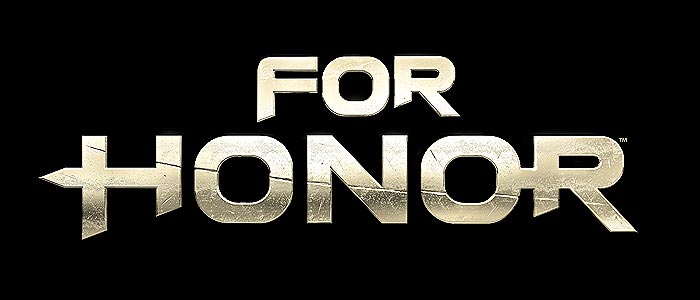
Ubisoft’s For Honor has undertaken a particularly tumultuous journey since its initial release in 2017. From it’s early beginnings, it appeared to be an innovative approach to the fighting-game genre, incorporating various RPG leveling elements as well as a plethora of customisation into what could only be described as a generally fun game to play. However For Honor has suffered from some glaring issues, some which are still unresolved today, predominantly the balancing between the different classes and the stability of matchmaking. However, there is a much larger problem with For Honor, a relatively unspoken issue that separates legendary gaming franchises from fun but forgettable thrill rides. This is of course, For Honor‘s lack of a compelling story.
There is no single problem with the lore of For Honor, and its failure to deliver a meaning narrative to the franchise can be broken down into many different reasons. Deconstructing the plot of the Story Mode itself demonstrates not only how hollow the story truly is, but also its various inconsistencies and plot holes. Comparing For Honor’s plot to God Of War‘s successful historically-inspired fiction highlights the game’s inability to distinguish between the history it is inspired from and the fiction it attempts to create. A comparison to Lord of the Rings: Shadow of Mordor’s Nemesis System, demonstrates how shallow For Honor’s Arcade Mode is at attempting to build upon the lore of the franchise through generating random storylines and quests.
Deconstruction of the Plot: A Truly Hollow Tale
For Honor‘s Story Mode is nothing short of abysmal, and does nothing to add value to the lore of the proposed franchise. The mode can be completed within a measly 4-5 hours of gameplay, probably even shorter if you choose to play co-operatively with a friend. The story is littered with one-dimensional characters from both sides, with questionable motivations throughout, and suffers from large explained time gaps, sometimes spanning many years, which can even confuse attentive players. Breaking down each of the three different story lines highlights the lack of attempt at story telling across the entire game.
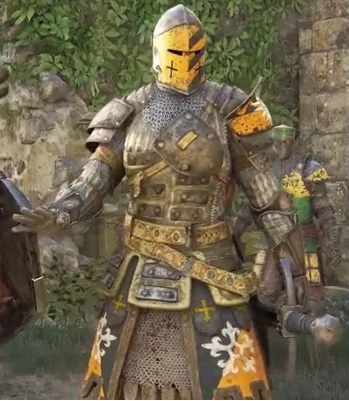
The beginning of the Knight’s story line is instrumentally exemplar to the overall vagueness and ambiguity that plagues For Honor‘s attempt at a story. The story begins with the Blackstone Legion’s assault upon a stronghold held by Hervis Daubeny, described as a “dishonorable lord turned mercenary.” What turned him into a mercenary? Unfortunately, you’ll never know. After Daubeny’s second-in-command, the Warden (the player), defeats the Blackstone Legion’s second-in-command, Ademar, the commander of the Blackstone Legion’s assault on Daubeny, Holden Cross, simply decides to leave the assault and take the Warden with him. So much for bringing Daubeny to justice I guess. The rest of his storyline involves the Warden becoming a member of the Blackstone Legion, assumingly attaining a high-ranking role of some kind, and after finding out that Apollyon just wants all the world’s factions to fight each other to “create stronger men to rule over the weak,” promptly decides to leave. The Warden decides not to leave when he realises this crucial information, from Apollyon herself, but only after the Blackstone Legion has plundered the halls of Viking Jarl Gudmundr to near annihilation of their people. Guess they had to squeeze in an extra story mission somewhere.
The Viking story makes more sense, beginning just after the aftermath of the Blackstone Legion’s decimation of Gudmundr’s jarl-dom, with a powerful warrior, known as the Raider “coming down from the mountains” to unite the viking clans that are squabbling over what the Blackstone Legion left over under the Warborn banner. The story progresses through the Warborn accumulating more followers by killing various high-ranking Vikings, until they come upon vast amounts of samurai gold, prompting the Raider to undertake the exceeding dangerous yet reasonably warranted siege of the source of the samurai gold, the Dawn Empire. However, the story line takes an abrupt ending, through after which the Warborn successfully land at the Dawn Empire, and pillage through the beaches and gates of the city, the Raider ultimately defeats a samurai general, Tozen, causing the samurai to retreat into “their greatest city.” Do we get to know if they succeed in financing and feeding their starving people? Will they ever return to Valkenheim? What is the name of the city that the samurai retreat to? Too bad, because the Viking story just ends, and we’re onto the Samurai story.
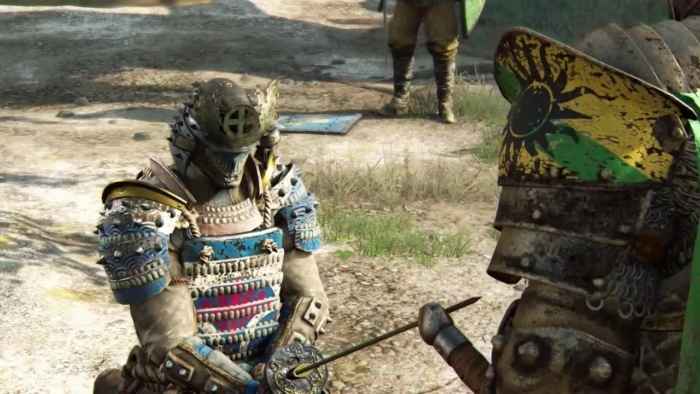
Upon starting the Samurai story, we learn that the Viking raid is still continuing, because defeating General Tozen was not quite enough to feed a Viking clan, but yet we still do not know at what point the Vikings will find the source of the samurai gold that brought them there. Never mind that, as the imprisoned Emperor’s Champion, the most powerful warrior of the Dawn Empire, has been freed during the chaos of the Viking raid. It is revealed that the Emperor’s Champion was imprisoned for “speaking out of turn.” And by revealed, I mean simply said without any explanation regarding who he was speaking to, what he said or the context of any of this. After helping the samurai push back the Viking invasion, the rest of the Samurai plot seems to conclude the ambiguity of the For Honor story, after the Emperor’s Champion eventually learns that Apollyon is the source of the Viking Raid, and she lead the Blackstone Legion against Gudmundr in the first place. The Emperor’s Champion meets the Warden from the Knight story, and after a brief duel, realises that the ultimate enemy is still Apollyon, and unites with the Warden to beleaguer the Blackstone Fortress. The Emperor’s Champion faces and eventually defeats Apollyon in a lengthy duel, to save all three factions from eternal war. Oops wait, it doesn’t, because after Apollyon is defeated the player is treated to a cutscene which tells them that even though Apollyon has been defeated, all three factions have since engaged in a lengthy period of war. The game truly ends, with an awkward peace meeting between different envoys of the factions, which doesn’t actually end in peace between the factions, but simply all three envoys acknowledging that war is bad, peace is good and is “worth fighting for and that it will make for an unforgettable tale.” Roll credits.
Historically Inspired Fiction: Comparison to God of War
A key part of how For Honor fails to effectively land its story is that it is ultimately unable to strike the balance between its historical inspirations and its attempt to create its own lore. Within the story there are numerous references to the actual world, whether through dialogue or its use of characters. They have warriors in ironclad armor that are referred to as knights, barbarian-like raiders called vikings and Japanese-inspired soldiers that call themselves samurai. During the Viking campaign, Runa tells Helvar that she doesn’t speak the language of the samurai, and refers to it as ‘Japanese’. The vikings of the For Honor have numerous references to Norse mythology, with the ‘Allfather’ being quoted by multiple Viking characters.
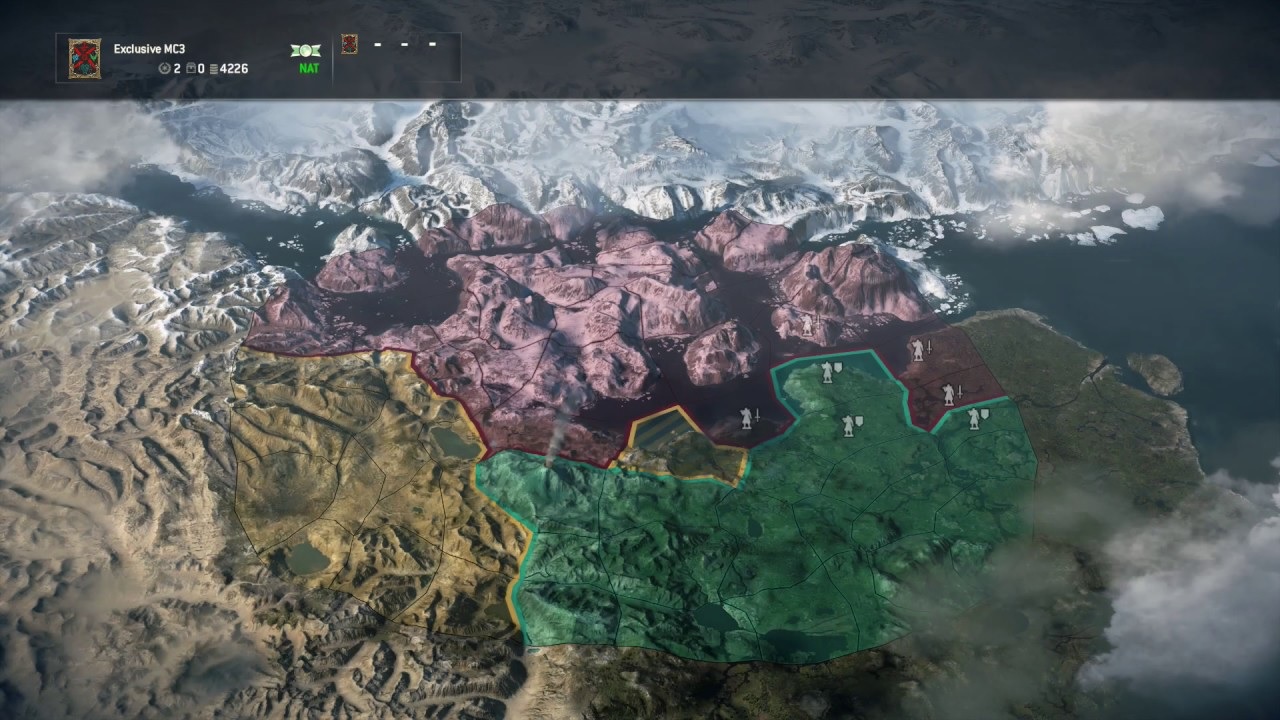
Despite this, the different kingdoms of the game are unique to its lore, Ashfeld, Valkenheim and the Myre, as well as the different factions of the game. Due to the fact that most of the characters are obvious incarnations of their classes in the game (“The Warden” is a Warden, “The Raider” is a Raider), it is hard to differentiate these characters from just simple classes from the multiplayer, as well as ascertaining whether or not some characters are ranked or socially considered higher than others within their armies and social structures. For Honor has an incredibly heavy inspiration from our own history and yet only a slight unique impact on this inspiration’s application to the story, being simply different names and the removal of the cultures and nationalities of the different faction’s inspirations (e.g. different European knights, different Scandinavian vikings). This ultimately makes its attempt at a story seem very much like a copy and paste from history, revealing a very shallow attempt at story telling.
In comparison, the plot of the God of War series is heavy inspired from Greek mythology, and yet carves out its own individual story. Unlike For Honor, God of War fully embraces its inspiration, to the point where it is not even inspiration, and simply occurs within the bounds of Greek mythology around the era of ancient Greece. The characters in the game are all icons in Greek mythology, the famous Olympians Zeus, Poseidon and Hades, the Titans Kronos and Gaia, and just about all the characters relevant to its mythology. The protagonist Kratos, starts off as a Spartan, a real-life place within ancient Greece, and becomes a god through his interactions with the various gods of the mythology, primarily the god of war, Ares.
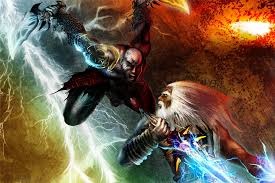
The plot of God of War is built along a fictional interpretation of the god Kratos within the fully-realized Greek mythology. He has interactions with certain key figures of the mythology, such as all the Olympians, the Titans and other mythological creatures which help us relate to these characters with our already formed understanding of the mythology. The interesting take on the mythology however is that it paints the picture that the Greek gods themselves are evil, and that Kratos, whilst an anti-hero, is given sufficient reason to defeat them and destroy Mount Olympus. Playing through the various mythological places such as Tartarus and Olympus, and facing off against different gods such as Hades, Poseidon and Kronos gives the story its individuality, by playing through the already established world of Greek mythology from a unique perspective. Overall, this is why God of War‘s balance between historical inspiration and unique fiction delivers an enriching story in comparison to For Honor‘s worldbuilding attempt by abridged fiction.
Randomly Generated Lore: Arcade Mode vs Nemesis System
Following the launch of the Marching Fire expansion, For Honor introduced an exclusive game mode available to players outside of the regular multiplayer combat modes called Arcade. Arcade mode can be played either single-player or through co-op, and allows players to battle against AI opponents, with both the players and the AI opponents receiving different modifiers. The main premise of Arcade mode was its “infinite replayability,” as the map the players are on, the opponents they battle and the modifiers all characters receive is randomized, allowing a different experience each time they play. Another key part of the Arcade mode, is that it presents a small story of the quest that the player embarks on, in an attempt to give a scenario to the player.
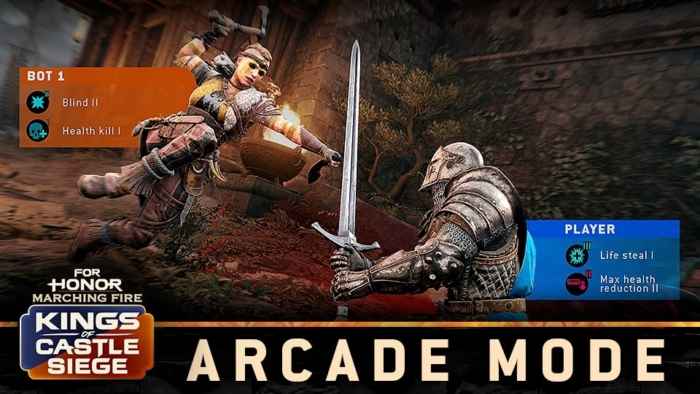
Upon reading this description, it may appear that Arcade Mode could indeed be perceived as a somewhat innovative way to inject lore into the game through a different avenue, but this attempt falls short of providing a meaningful impact on the story of For Honor. The main reason for this, is that the “small stories” that Arcade mode presents have no correlation to the main story of For Honor or its mythology. There will occasionally be a character from the story mode as an opponent to play against, but it is not explained whether or not the scenario the player is engaging in is part of the canon of the game, and if it is, when and where it occurs within the timeline. The majority of instances of Arcade mode include characters and scenarios that are, quite simply, made up, and unconnected to each other or the rest of For Honor’s lore. Overall, it is an abysmal attempt at both story-telling and expanding the lore of the game, and comparing Arcade mode to another game that involves randomness, helps demonstrate this.
Middle-Earth: Shadow of Mordor received universal critical praise for its innovative game system, known as the Nemesis system. The Nemesis system involves a hierarchy of orcs, leaders and lackeys, and the player defeating certain enemies causes different lackeys to become leaders and new lackeys to enter the fray respectively. If the player is killed by an orc, that orc will receive a promotion, and the combination of leader and lackeys in Sauron’s army shuffles yet again. In combination with this real-time adapting system, each and every named orc in the game is procedurally generated, meaning like in For Honor’s Arcade Mode, each enemy is given a unique set of characterstics as well as an individual aesthetic appearance along with a unique name and title.
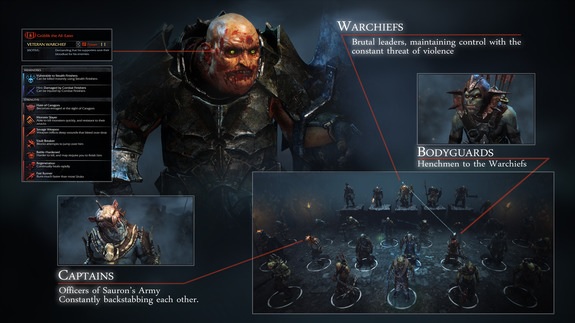
Shadow of Mordor revolves around defeating and/or dominating certain orcs of the game to raise your own army and defeat Sauron’s, and part of the challenge of the game, outside of combat, is discovering the strengths and weaknesses of the procedurally generated orcs through interrogating their underlings or scoping out their hideouts. This mechanic of intelligence-gathering is revolutionised by the fact that the orcs are randomly generated, so each time the player goes through the game, not only do they have to find out all the strengths and weaknesses of those characters, but it will be absolutely different every single time. This experience is augmented by the fact that these randomly generated orcs appear in cutscenes with the player, affect the story of the game in their unique ways, as well as having unique dialogue for the player every time they encounter them, from first appearances, to if they have killed the player or if they have betrayed the player whilst under their control. Overall, the way the Nemesis system is the foundation of the story and plot for Shadow of Mordor demonstrates how For Honor’s Arcade mode pales in comparison in regards to a story-telling mode that incorporates randomization of enemies.
In conclusion, many aspects of the plot of For Honor fail to make it a story worth telling or remembering. The overall delivery of the story, its confusing time jumps and ending that implies pointlessness, amount to a fundamentally flawed narrative. The failure to strike a balance between individual fiction and historical inspiration makes it fall short of the narratives of other franchises, such as God of War. The attempt to inject lore into the game through randomization was similarly poorly executed compared to successful attempts such as the Nemesis System of Shadow of Mordor. Overall, For Honor’s lore remains a broken narrative without any serious effort to make it something worth remembering.
What do you think? Leave a comment.




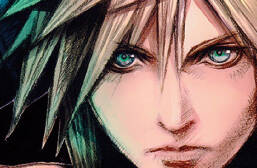






This game’s lore has a ton of potential. An RPG that allowed the player to explore the three distinct cultures, plus their subcultures and factions, could be extremely cool if done well. Not only that, but to explore the world and its map would be extremely fun as well
I feel like they missed so many opportunities in the story to expand on the lore. I know it won’t happen but story DLC would be amazing.
A good DLC story. Becouse the original one kinda sucks and was there just to show why is everyone fighting and, well, becouse it is a AAA, so they had to make it.
Definitely, focus more on the three main characters instead of jumping from class to class. Better yet, let you choose your class and be one of the leaders in this new faction that wants peace.
Great article. But to all the gamers: Try not too look at it as a parallel to real history. I’m positive the only connections they are making is the fact that Samurai, Knights, and Vikings existed at some point in time. Everything else as far as connecting to our past is irrelevant.
The world is a complete fantasy world filled with fantasized versions of historical warriors embroiled in a war. I wouldn’t go much deeper than that as far as trying to relate to our world.
Watched a few streams and wasn’t impressed, and the streamers themselves didn’t seem to be very impressed.
Honestly, what this game really needs is a starwars skin. Was anybody else thinking this is the level of depth the lightsaber duels in Battlefront should have had?
They had such an awesome concept, and almost completely crapped the bed.
I instantly fell in love with this game despite its flaws, its just so fun.
I thought it was really bad. It felt very awkward and clumsy, there weren’t any good characters. The final fight sucked really hard since I don’t play Orochi and Its super unresponsive on mouse and keyboard. You also cant resume progress in a mission, so I crashed and had to do a level over once which was annoying. The whole thing was very tedious.
Knight was okay. Viking on the other hand..
Fighting an Orochi who has triple your health, double your damage and can not exhaust his stamina and regens his health …is just..well. Unfair.
I really enjoyed it, its a good way to get a feel for each class and how they play out. Not a fan of the chapters where i had to play classes i disliked (i just dont like valkyrie, AT ALL) but like i said, decent practice.
The knight story was, yes, a glorified prologue, the viking story i felt had pretty interesting characters, really had the feel of a viking, living for combat (except Runa. Strong silent type, ehhh, to me that just means a lack of depth). Samurai plot was also pretty good, orochi especially.
The cliffhanger ending sucks but what can ya do, this game is about multiplayer.
Probably the worst story campaign I have ever played.
I totally thought that the grand scheme of Apollyon was to unite the three factions against her as the common enemy in order to finally achieve peace. But nope, she just loves war and the story ends right where it started. So stupid.
Actually, the common enemy plot twist would be briliant, shame they didn’t go for it.
I mean, it’s a videogame. Things in For Honor may be based on real world events/warriors but it’s never been intended to be entirely historically accurate.
Personally, this is why I completely reject the idea of For Honor being a divergence from our world. Sure, Valkenheim looks like Denmark and Ashfeld roughly corresponds to Germany (poor Poland got flooded and then turned to swamp D: ), but For Honor’s setting is just too diverged from our own even accounting for the cataclysms shaking everything up. Plus I find it more interesting that way, even if in my own writing I draw heavily on history as a reference point.
Plus, the lore we do have is already pretty interesting. It just fell short of being fully used in the story mode with how brief it was.
This is why I kind of wish that For Honor took place in a fantasy setting that was just low/ no magic.
I feel like setting it in an alternate history Earth was either limiting, as these cultures didn’t exist at the same time, or pointless, as they woukd have to bend the rules anyway to get the setting they wanted.
Original vision was to draw on our fantasy concept of these cultures.
I get that the entire thought process was “this game needs to be about fighting, so the different cultures are just thrown against each other for some reason and they have just been fighting ever since.” In that sense, the lore does the least amount of qork necessary to set up the basic premise, and that is fine.
I just think that of they had wanted to put in more work, the setting could have been really engaging, and elegated the game a lot.
I used to be addicted to Warcraft due to the lore. So as a lore-nerd I’m down for expanding For Honor lore.
On my free time between matches i think about the lore and wondered if they ever did a For Honor 2 that it should be a prequel, Apollyon’s origin but also have like someone that was loyal to her and have her try to avenge Apollyon, that way we could get deeper into the lore of the Newer characters like gladiators, cent, Highlander but also keep up with what happen after the first game, seeing how maybe young Apollyon maybe was taken slave, made to be a gladiator, trained with cents as a warden, and up to the point where she got her revenge on the LB that abandon her village and became the bad ass we know her as, also would explain how she had those moves that we didn’t get until the first DLC dropped. Anyways an origin story would also allow for devs to keep all of the older cast and rework them, and then make the newer characters up to par, im just rambling sorry if you read this far…
Did someone say lore? I love lore. Just a shame I can’t find any in this game.
I want to know one thing. This world is in war for 1000 years. And as we can see in dominion, they are thousand of death on point B. so. how can they keep their army for 1000 year ? do they have farm where women are breed in chain to make soldier ?
It’s an alternate universe, things didn’t happen like ours did!
I’m only 4 missions into the campaign, but it honestly isn’t bad. Voice acting is well done, story line is a little cliche but there is a bit of depth to it. To be fair it plays more like a movie with all the cut scenes than a game sometimes. But with their main focus on MP, they aren’t going to make some crazy open world 3 faction war as the single player. With the combat style and the fact that the focus is MP, they did well. They also made it so that you can get in-game currency, emblems, and other items through the story that you can use in MP is a nice bonus. Also as a bonus, the story is co-op.
I enjoyed it thoroughly although the voice acting seemed a little lack luster at times, but, what can you do.
I think the story mode is very nice. I played complete story on realistic and I’m not shitting you, endboss fight was a straight on 30 min. Fight!
I haven’t died once it was just a half hour fight… was amazing! Sure I had to play defensive because of the lack of attack direction indicator but it was soooooo fun!
Ubisoft stories are so shorten the time of fighting down to a 100 or 200 years, they clearly don’t realize how long 1000 years is and there’s so need for a mustache twirling villain 3 different cultures living close to each other that’s enough for a war in on its self but there’s also limited quality land more reason for fighting.
You missed the perfect opportunity to call it ‘Lore Honor’.
Anyone else find it weird that it was the viking who wanted peace!
Played the beta on Xbox1. Was pretty entertaining for a while but the AI hero’s are hard to take down. Almost to the point of leaving any match with more than 2 AI heros.
I did find the game really repetitive and a reallyyy steep learning curve.
Good points you’re making. I stopped playing this ages ago.
The Story had plenty of hidden details, easy to miss…Remember Appollyon’s armor? It’s the refitted armor set of a lawbringer that poly killed to avenge the village he abandoned.
I think people are expecting too much out of games now a days. They just get so hyped about it, thinking it’s going to change the industry.
Some people complain about the story but how much do you need? Vikings, knights, and samurai are fighting what more do you want!
This is a very well-written article! I especially liked your insight comparing the lore of For Honor to God of War. World-building is so fundamentally important, especially for high fantasy and science fiction games and stories. Just like in creative writing, if the world-building doesn’t support a fantastic plot, or the world-building is strong and the plot is weak, then the story will be unbalanced.
Pissed me off to no end because the Samurai story is nothing but Orochi.
this is the most nice information here.
thaks
The story is lackluster most likely because it was an afterthought compared to the multiplayer.
It’s foolish to judge For Honor on it’s story. As a longtime player and someone who has been following the game since it’s announcement at E3 2015, I can confidently say that it’s always been about a love for (admittedly stylized) ancient combat. They story serves little more than as a backdrop for the faction war and suffers for it.
Granted the game game out only shortly after Battlefield 4 (with a similarly awful campaign) and Titanfall (a game with no single-player campaign). I think it was a symptom of the times; a mistake that can’t be corrected with DLC. Ubisoft has improved as a developer/publisher since then, putting more time and effort into their games, and FH has improved with it, fixing many balancing issues and is well on its way to doubling the original amount of characters.
I think For Honor has a lot of potential to be a more engaging game story wise. However, the games that you have used to compare For Honor to, are quite different than it.
Both God of War and Shadow of Mordor are single player focused action games. The story and narrative are a major component of these games, and they have spent a lot of time in building up their world and mythos.
For Honor, although it does have a single player component to it, does seem to be primarily focused on the combat and how that can be used in a game loop for multiplayer. Although they seem to have spent a little time on building some lore, the game is focused on the combat.
I think the bones are there for a more engaging story, but I don’t think that it is the focus, nor the aim of For Honor at its core.
The campaign had several potentially interesting characters, along with rich veins for faction based lore. It’s a shame it played out more like a tutorial than a story mode.